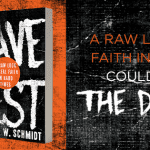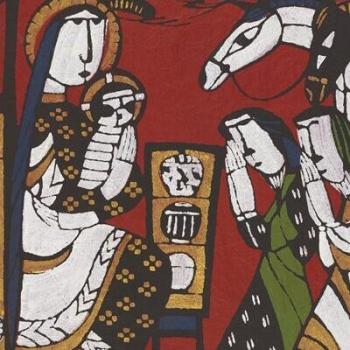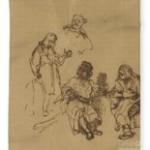 Taking The Dave Test during the Holidays
Taking The Dave Test during the Holidays
Question Two: “Can I give up my broken gods?”
Introduction to the series
Much of the last year was thread through with considerable loss. My brother, Dave, battled a fatal brain cancer for nearly eight years and he died this last January as the result of a fall that was due in large part to his disease. He would have been 58 years old in October.
In reaction to Dave’s quest to find a durable faith and supportive friends, I wrote a book called The Dave Test, which was just released by Abingdon Press and featured at the Patheos Book Club. The book distills Dave’s quest into ten questions that any of us can ask ourselves, when we are in one of life’s hard places or when we are trying to support those we love. Whether that hard place revolves around divorce, death, unemployment, abuse, illness, or some other misfortune, I hope that the questions I ask and the answers the book offers will help us all sit a bit more easily with life’s ragged edges.
Over ten weeks I plan to apply the questions in The Dave Test to our preparation for the holidays. At this time of year for many there is — as the expression goes — “no cause for celebration.” But I am convinced that there is reason for hope and I don’t believe that we need to navigate the holidays alone. I hope that the book and this application of The Dave Test’s principles to the holidays will help ease the sense of isolation that is so much a part of life for many of us at this time of year.
This week’s Dave Test question: “Can I give up my broken gods?”
Did you ever sense that the people around you were more interested in defending their understanding of God, than they were in caring for you in one of life’s hard places? I have and I have talked to a lot of people who have had that experience.
Ironically, when we try to explain away the suffering of others in order to protect our understandings of God, the God we end up defending is often cruel, unfeeling, remote, and unworthy of the word itself. When the God we can’t give up is less loving, tender, merciful, and moral than our best visions of what it means to be loving, tender, merciful, and moral, we are probably trading in broken gods. When we traffic in broken gods we also deepen the isolation that people experience by implying that God is the one tormenting them — or by implying that the only people who suffer are those who have done something wrong.
We traffic in broken gods for a lot of reasons. Some of what we defend, we defend because it is familiar. The images of God we buy into are the product of early childhood experiences and whether they are good for us or not, they feel “right.” Others of us insist that God makes things happen that are immoral and destructive in order to console ourselves with the notion that God is in control, even if life itself feels out of control. And we often trade in broken gods because we are afraid that if we give up the broken gods we believe in, we won’t have a god of any kind in which we can believe.
None of that is true, of course. Views of God that are “caught” early in life may or may not be helpful or reliable. There are other ways of thinking about God. And embracing an understanding of God that makes us comfortable, but leaves us with a monster to worship is as much a source of pain as any life experience might be.
The stakes are even higher during the holidays. Many of the holidays that we celebrate are explicitly religious and most of them assume one kind of god or another (even if it’s a generic, universal parent-figure). When our broken views of God get wrapped around that celebration, then it makes it that much harder for those who are suffering to connect with the communities that celebrate those holidays.
The mark of a community that can be trusted to welcome those dealing with life’s painful places are communities that honor understandings of a God who is loving, compassionate, and ready to grieve and struggle with us, when we grieve and struggle. Look for one if you are struggling with death, illness, divorce, unemployment, abuse, or other crushing life experiences. Join one if you really long to care effectively for those around you.















